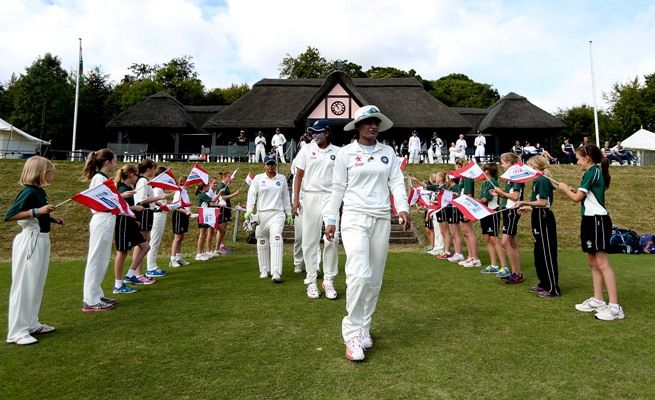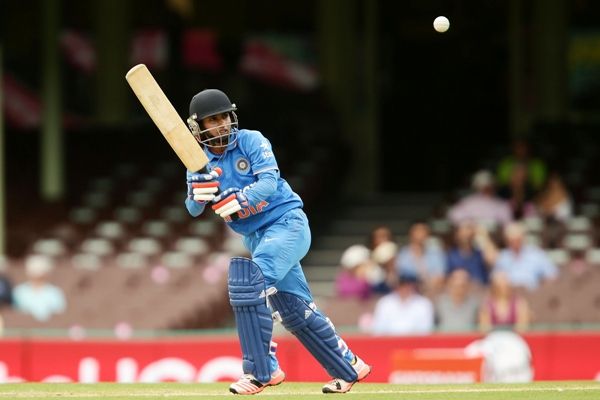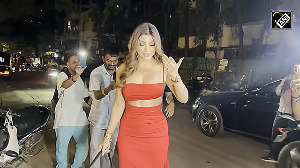'I only played it to repay the sacrifices and hard work that both my parents had put in to make me play the sport.'
'I feel proud of them that they fought against orthodox notions of society to help me take up a sport.'
Mithali Raj, the poster girl of women's cricket in India, is the second highest run-scorer in the history of women's One Day Internationals (England's Charlotte Edwards: 5,992; Mithali 5,301).
The captain of India's women's team, Mithali made her debut in 1997 at the age of 14 and went on to lead the team to the 2005 World Cup final in South Africa, arguably her biggest achievement as captain.
The 33 year old is disappointed after missing out on the opportunity to win the World T20 title on home soil last month and is now looking at the 2017 ODI World Cup in England.
Mithali Raj speaks to Aruneel Sadadekar/Rediff.com about the highs and lows of her distinguished 19-year career.

Ahead of the World T20, you had spoken of the golden opportunity to popularise women's cricket in India. How disappointed are you to suffer an early exit in the tournament?
Extremely disappointed! I feel the defeat by a narrow margin against Pakistan in a run-curtailed match affected our confidence in the tournament. We lost the next two matches closely to exit early.
There was immense hype ahead of the tournament and the aim was to at least reach the semi-final and take it from there.
We were one of the favourites and the World T20 was our perfect chance to show fans what India's women's cricket is all about.
You made your debut at the age of 14 in 1997. How do you look at this long career?
I started at a time when women's cricket was nothing in India. I remember when we used to travel in trains with our kits, people used to ask us if we were hockey players as women's hockey was famous back then.
When we told them that we were cricketers, we had to face stereotypical questions like whether we bowled under-arm or if the rules for women's cricket was different from men's cricket. I used to wonder if such questions are asked to women tennis players as well.
Now, things have changed drastically. There was neither fame nor money back then. Today, I feel proud when a young player looks up to me as a role model.

How did this journey start for you?
Frankly, I never liked playing cricket. It was forced on me. My father, an army man, was a disciplinarian and wanted me to wake up early in the morning. I used to accompany my brother to his cricket coaching and ended up picking a bat.
Back then, it wasn't easy for a girl to take up a sport. An outdoor sport like cricket was a total no-no. My grandparents and relatives all had objections with me taking up the cricket.
I never felt inclined towards cricket as I was completely focused on Bharata Natyam. I am a trained dancer and loved performing on stage. It was my dad who wanted me to play cricket while my mother's interest was dance.
I played the sport only to keep my dad happy. When I debuted for India, I wanted to perform to fulfill my dad's dreams.
Cricket was never a road to fame or a means to make money. I only played it to repay the sacrifices and hard work that both my parents had put in to make me play the sport.
I feel proud of them that they fought against orthodox notions of society to help me take up a sport.
When did you decide to follow cricket professionally?
My rise in cricket was rapid.
Gradually I started to fall back in dancing. My mother had to finish my homework to help me cope with dance and cricket.
Eventually my dance teacher advised me to choose between the two and that is when I decided to follow cricket. I was already selected among the probables for the 1997 World Cup.

Were there times when you felt out of place or wanted to quit?
Many times. My debut series, I had no idea what was happening. I cried. My mother, like always, told me keep up the fight.
A serious knee injury in 2005 affected my fitness.
After the highs of the 2005 World Cup, it was difficult to carry on every single day.
Ahead of the 2009 World Cup in Australia, I had decided to retire after the tournament. I was on pain killers and it was getting unbearable at times.
The tournament was televised in India. There was a massive difference after the 2009 World Cup. I had performed well in Australia.
People started recognising us and there was more recognition. We were given physios who took care of our fitness. The knee injury affected me, but I had decided to carry on for a couple of years.
And look now, it has been seven years and the knee injury has subsided to a great extent.

Do you plan to retire after the 2017 World Cup?
(Laughs) We will have to wait and see how my fitness is after the tournament. I don't want to be a liability on the team.
The team is evolving and if I think the team doesn't need me anymore I will hang up my shoes.
You had spoken about equal remuneration for men's and women's cricket.
I started at a time when we didn't get any money to play for India. My dad had to spend from his own pocket for my bat. Now I can sponsor bats for young girls.
I feel we players can help women's cricket. If we improve the quality of our game, we will have more spectators and sponsors.
The BCCI is the richest cricket board in the world, but it makes money because of men's cricket.
We need support from men's cricket for at least the next two years to take women's cricket to the next level.

Many men cricketers have been seen sharing tips with your team. Who is that one player, you respect the most or idolise?
I never idolised anyone when I started playing. During my rehab time at the National Cricket Academy I learned a lot from Rahul Dravid.
I remember practising and turned to see him watching me bat. After that, he spent a lot of time, helping me improve my technique.
He himself took the initiative to improve my game. I have tremendous respect for Rahul Dravid. He is a true legend.
Do you regret taking up cricket in favour of dance?
(Laughs) Earlier, I used to. When I wanted to quit in 2009, I had decided to go back to dancing and fulfill my mother's dreams as I had achieved a lot trying to fulfill my father's dream.
But now women's cricket has changed. It has become more professional. My team depends on me and I have enjoyed every moment with my girls.
Right now the focus is the 2017 World Cup, but after I retire, I might take up a dance class to follow my passion.













 © 2025
© 2025